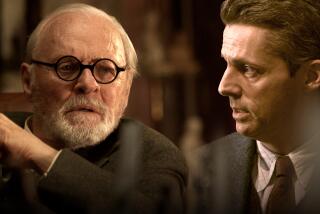THE OPENING QUESTION : FINAL ANALYSIS: The Making and Unmaking of a Psychoanalyst <i> By Jeffrey Moussaieff Masson (Addison Wesley: $18.95; 212 pp.) </i>
- Share via
Psychoanalysis is besieged from so many sides now--women understandably outraged at Freud’s insistence that their memories of childhood sexual abuse are mere “fantasies”; cognitive and drug-based therapies rejecting long-term treatment in favor of the quick fix--that we are inclined to wonder whether we need another author ringing the profession’s death knell.
True, Freud, like his contemporary, Marx, failed to realize his ideal--letting patients free-associate until a picture of their unconsciousness emerges naturally--but its sheer ambition inclines us to forgive him in the hope that others will build on his foundation.
This, however, turns out to be precisely what Jeffrey Masson was trying to do when he questioned Freudian theories in the presence of a New York Times reporter. Rather than reacting as a callow field eager to refine its ideas through debate, however, the psychoanalytic establishment, like a cult zealously guarding its master’s truths, summarily dismissed Masson from his duties as director of the Sigmund Freud Archives.
That Masson had attained such a prestigious position should ease our suspicion that this is simply another bitter tell-all book. There are some hard feelings. His conclusion that psychoanalysis will never be able to “break taboos, seek truth, or alleviate suffering” does not follow from his observations of the flaws of some analysts. And while he presents himself as a lone warrior, the truth is that Freud’s sexual theories have been attacked by analysts from Jung to Alice Miller, who does so in a book published this month.
Overall, though, “Final Analysis” is a powerful work, especially important for its warning about the power that psychoanalysts can wield over patients. “It is rarely possible, when a human being is in deep need, to look upon somebody who offers help as merely another flawed human being with whom one is going to engage in a protracted conversation,” Masson writes, reminding us that “there are no experts in loving, no scholars of living, no doctors of the human emotions and no gurus of the soul.”


